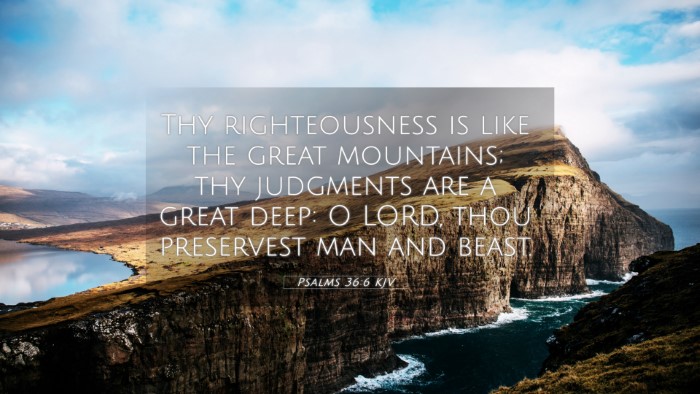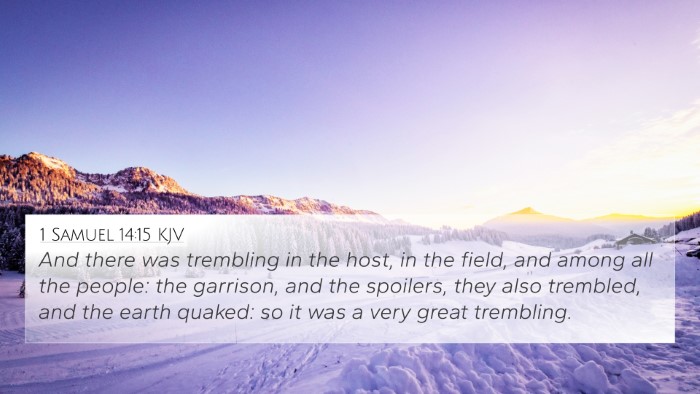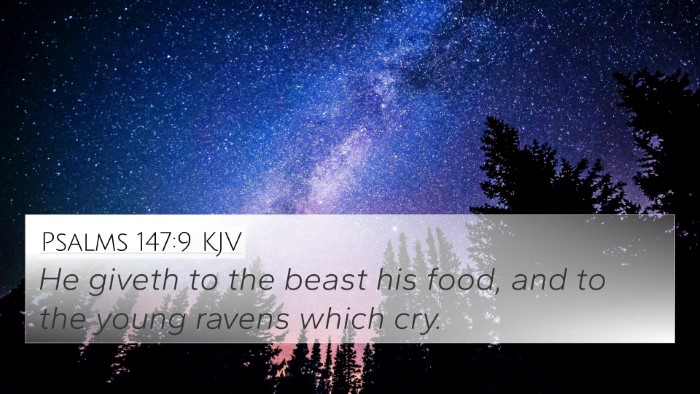Psalms 36:6 - Understanding the Verse
Psalms 36:6 states: "Thy righteousness is like the great mountains; thy judgments are a great deep: O Lord, thou preservest man and beast." This verse reflects God's attributes of righteousness and mercy, highlighting the vastness of His judgments and the protection He offers to all creation.
Introduction
The complexities within Psalms 36:6 open avenues for deep theological reflection and comparative Bible verse analysis. This exploration involves understanding the meaning of God's righteousness and judgments, connecting it to various scriptures across both the Old and New Testament.
Meaning and Interpretation
According to Matthew Henry, the righteousness of God is likened to great mountains—symbolizing stability, strength, and immovability. This imagery reassures believers of the constant nature of God's moral order. Furthermore, the deepness of God's judgments suggests their unfathomable wisdom and fairness, reminding us of His omniscience.
Albert Barnes adds to this interpretation by emphasizing God's protective role over humanity and all living beings. The verse positions God as a guardian, reiterating His care and provision throughout creation. The terminology reflects a cosmic scale, aligning with God's majestic character.
Adam Clarke elaborates that the great mountains signify an unshakeable foundation, and the great deep represents the infinite depths of His judgment—both contrasting human frailty with divine permanence. This contrast underscores God's sovereignty over life and nature.
Related Bible Cross-References
In exploring Psalms 36:6, we can identify several significant Bible verses that share thematic connections:
- Psalms 147:4 - "He counts the number of the stars; He calls them all by name." Reflects God's omniscience and care for creation.
- Isaiah 55:8-9 - "For my thoughts are not your thoughts, neither are your ways my ways, saith the Lord." Illustrates the wisdom of God's judgments compared to human understanding.
- Romans 5:8 - "But God commendeth his love toward us, in that, while we were yet sinners, Christ died for us." Connects God’s righteousness to His love and mercy toward humanity.
- Matthew 5:45 - "For he maketh his sun to rise on the evil and on the good." Shows God's care for all creation, paralleling the idea of preservation in Psalms 36:6.
- Psalms 9:8 - "And he shall judge the world in righteousness, he shall minister judgment to the people in uprightness." Reinforces God's role as a just judge.
- Psalms 37:25 - "I have been young, and now am old; yet have I not seen the righteous forsaken, nor his seed begging bread." Highlights God's faithfulness to the righteous, resonating with His preserving nature.
- Lamentations 3:22-23 - "It is of the Lord's mercies that we are not consumed, because his compassions fail not." Relates to God's enduring compassion toward mankind.
Thematic Connections
Through examining the interconnectedness of these verses, we unveil thematic continuity:
- Righteousness and Justice: Many verses, like Psalms 9:8 and Isaiah 55:8-9, explore the theme of God's justice, paralleling the righteousness celebrated in Psalms 36:6.
- God’s Provision and Care: References like Matthew 5:45 and Psalms 37:25 indicate a consistent biblical message about God’s protective nature toward His creation.
- Divine Mercy: Scriptures such as Romans 5:8 and Lamentations 3:22-23 encapsulate the essence of God's mercy— a crucial element in understanding His judgments and righteousness.
Tools for Bible Cross-Referencing
The study of Psalms 36:6 can be greatly enhanced through tools such as Bible concordances and Bible cross-reference guides. These resources assist in linking Bible scriptures, allowing for deeper insight through thematic Bible verse connections.
Cross-Referencing Bible Study Methods
Utilizing a bibliographic cross-reference system, one can identify and analyze patterns and themes across various books of the Bible. This method assists in enhancing sermon preparation and understanding complex theological concepts.
Conclusion
Psalms 36:6 invites believers into a profound understanding of God's nature through comparisons of His righteousness and judgments. This exploration signifies not only appreciation of the text but also encourages inter-Biblical dialogue, facilitating a comprehensive approach to studying Scripture. By engaging in comparative Bible verse analysis and recognizing connections between Bible verses, believers can deepen their faith and understanding of the Almighty.


























